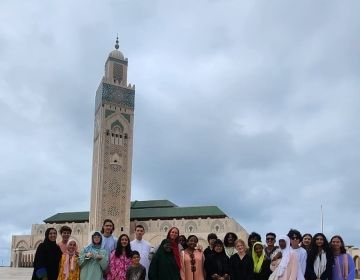Bismillah: Language and Culture in a Moroccan Café
Though not a conventional blog post, I nevertheless wanted to share my final project for my intensive Darija course. Despite having written it in my first week in Morocco, the observations on culture and language still ring true to my experiences after five months in the country. I originally wrote the following poem in English while sitting in a Moroccan café, later translating the work into a combination of Modern Standard Arabic (MSA) and Darija, Morocco’s regional Arabic dialect. I memorized and recited the work for the Intensive Darija final presentation. The subject matter was in response to the project’s prompt: “Discuss, in Darija, your first impressions, experiences, or thoughts on an aspect of Moroccan culture.” In the poem, the café culture, with heavy French influences, is obvious. Less evident to non-Arabic readers, though, is the mixture of MSA, Darija, and English loanwords, meant to evoke the complexity and humor of the Moroccan linguistic landscape.
بسم الله
السمية ديال الله1
الأول شي هنا
ممكن الأول شي ف أي بلاصة
كنفكر ملي
نقلب على الجواب
كنهز الكاس إل فمي
وبزربة
كنحرّق لساني
ممكن هاد الجواب
ممكن هادي السمية
صعيب تمييز
ف الكلمات الغريبة
وصوت الجرّان دالكراسى
2"نص نص،"كنضحك
"هاف هاف"
ولكن كلها ساخنة
إدن كنشرب الما
الما
سميته بحال "مه"3
ولكن عمرني ما
كنقولش "مه"
،وملّي كنشرب
الحروف الساكنة
كتقطع حدايا
وأنا مدكدك
باللغة السندويشية4
بلا توقف
بلا حركات
مقهى هي قهوة
والقهوة ف القهوة5
وجوج بهم كيخواو
قاع ديال كاسي
قاع ديال كينونتي
ولكن أنا التخت
إدن كنشرب بشوية
وكنتسنى الجواب
وحتى السمية
مرّة تانية
بسم الله... بسم الله
6الحمد الله... الحمد الله
Notes:
[1] Here, I translate Bismillah, a phrase in classical Arabic meaning, into Darija, though no Moroccan would ever use the Darija translation.
[2] “Nus nus” directly translates to “Half-half” (transliterated from English in the next line of the poem), and is a common drink in Moroccan cafes, mixing half coffee and half milk, hence the drink’s name.
[3] The specific pronunciation of water (something close to “muh”) in Darija always makes me laugh, as my requests for water, in my mind, always sound like a supreme indifference toward hydration.
[4] Here, I refer to Darija as a “sandwhichy” language, given Moroccans’ frequent observation that their dialect lacks much of Modern Standard Arabic’s harakat, or short vowels, due to the influences of local Tamazight dialects. The effect sounds as though Moroccans are eating the words, always a funny piece of imagery.
[5] In this line, I show how the Modern Standard Arabic term for café is replaced by the word for coffee, like in French, which creates a frequent source of ambiguity for outsiders learning the dialect for the first time.
[6] Bismillah, "In the name of God," can be used to precede most any action, invoking God's name to bless that action. Similiarly, alhamdulillah, "Praise be to God," often marks an end to a meal, as well as a response to "How are you?" Given my limited Darija abilities when I wrote the poem, the two phrases were easiest to discern from the conversations at the café.
English Translation:
Bismillah
In the name of God
The first thing here
Maybe the first thing anywhere
I think
As I search for the answer
I lift the cup to my mouth
And immediately burn my tongue
Maybe this is the answer
Maybe this is the name
Difficult to discern
Through the foreign words
And scraping of chairs
Nus nus, I chuckle,
“Half half”
But all heat
So I drink the water
“Muh”
A name like “meh”
But I am not indifferent
And as I drink,
The consonants cut around me
And I am exhausted
Of the sandwiched language
All pauses consumed
Café is coffee
And the two blend together
Simultaneously draining
The bottom of my cup
The bottom of my presence
But that makes me the dregs
So I sip more slowly
And wait for the answer
And also the name
One more time
Bismillah… bismillah
Alhamdulillah… alhamdulillah
Author: Charlie Johnson
Related Posts
A Weekend Getaway to the Blue City
A breathtaking blue oasis nestled in the Rif Mountains of Morocco, Chefchaouen is a picturesque town renowned for its vivid blue-painted buildings and rich cultural heritage. This past weekend, the... keep reading
A Visit to Casablanca's Hassan II Mosque
Our Language and Culture students wrapped up this week with a visit to Casablanca’s Hassan II Mosque. As the third largest mosque in the world, and largest in Africa, Hassan... keep reading
Our First Community Conversations!
This week, our Language and Culture students started their community conversations! Every weekday, our students learn new vocabulary and questions in their Moroccan Darija classes and then go out into... keep reading




